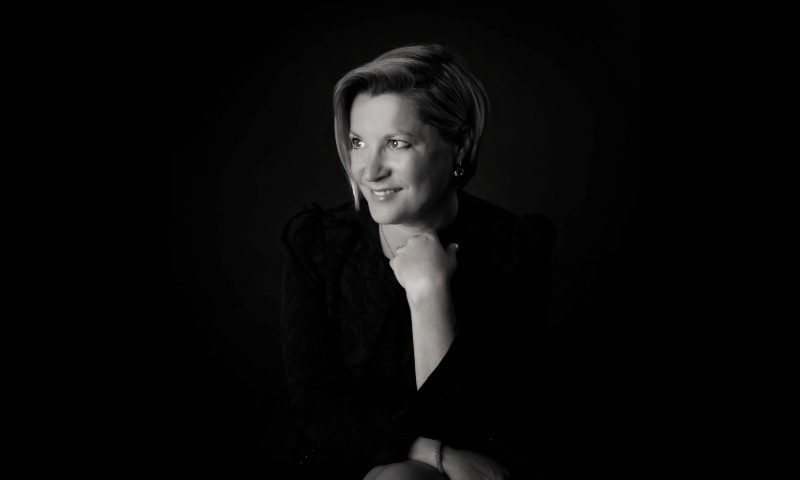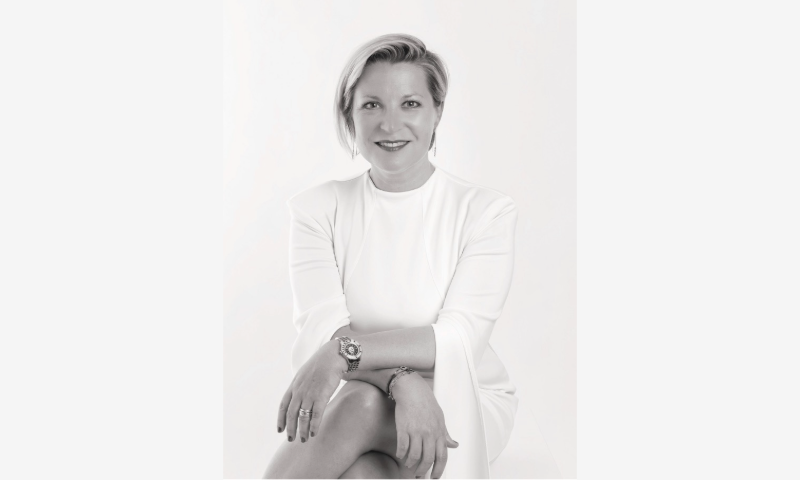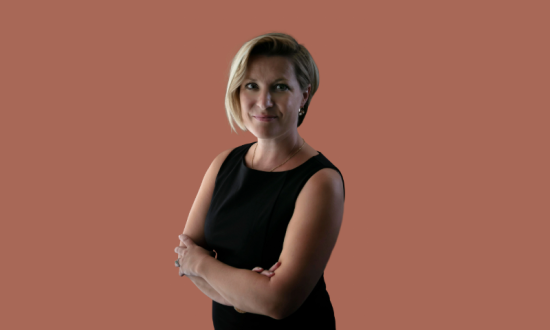Audrey Daumain is a Business Operational and Digital Transformation Expert and a High Impact Performance Coach with over 20 years’ experience in the Finance and Luxury industry. Born and raised in France, she moved to London in 1998 to start her successful banking career. Audrey moved to Switzerland in 2010. She notably held executive positions in Barclays Private Bank, National Bank of Abu Dhabi and Edmond de Rothschild Private Bank. Over the years she specialized in large scale transformation and performance improvement programs, internal communication, corporate & people development strategy. In 2020, Audrey decided to build her own consultancy, Smart Perspective, and is now working with some of the biggest names in the Energy, Luxury and Financial sectors in the world.
An NLP Coach, Non-Violent Communication Expert, Audrey is also a seasoned organizational design expert and the co-author of an Amazon best-selling book, Inspired Journeys. Having had to overcome trauma and grief, as well as evolving in a man dominated environment, Audrey ‘s life story is that of Resilience, Faith in Humanity and Love. Today, she works with dedication, passion and conviction to bring back humanity, healthy dialogues and meaning in our workplaces.
Recently, in an exclusive interview with Digital First Magazine, Audrey shared her professional trajectory, insights on the future trends shaping the workforce, thoughts on gender equality and inclusion, future plans, words of wisdom, and much more. The following excerpts are taken from the interview.
Hi Audrey. Could you tell me what initially sparked your interest in the topic and why you chose to explore the future of work?
I have been fortunate enough to grow up in beautiful south of France, then move to the UK in 1998 and Switzerland in 2010. These three experiences have enabled me to witness various work environments and cultures over the years. I started in Banking by simple opportunity it wasn’t really planned, and I stayed in the industry for over 20 years. Something struck me from a very young age: people grow, they climb the “ladder”, they gain titles and widen their spectrum of impacts, but rarely do they become better at communicating along the way. So, we can have the best strategies, choose the best tools, but in the end real success always, always depends on PEOPLE. How they communicate, understand, interpret, and consider each other. I have observed them, researched, trained and decided that I wanted to make a difference in the workplace by helping Leaders and teams to properly consider each other and hold meaningful conversations.
What trends do you see shaping the workforce? And what technology do you think will disrupt your industry in the future?
In terms of trends, we have a very large number of University studies highlighting that one of the very first emerging trends (and I am already witnessing this with my clients) is a decentralization of the workplace and a rebalancing act between power over people (top-down heavy management) to power with (inspiring and guiding more autonomous and self-managed teams). We all remember this “Knowledge is power” – now that online education, ready to use tools and so many other sources of information are available we notice a huge change in consumer vs seller dynamics for ex (online research, benchmarking etc..) and this is true for the workplace too. Experience remains a differentiating factor – but knowledge as such is losing its competitive advantage. Human beings have always been profoundly attached to their knowledge – as if it was defining their ultimate intrinsic value. I invite them to explore what they do not KNOW, to be continuously curious and unlearn so they build their competitive advantage whilst developing their profoundly human skills (listening, consideration, care and meaningful ambition).
The second trend is obviously linked to the humongous growth of technology. I was recently interviewed by the University of Geneva on the impact of AI on the workplace. AI /AR are already taking up such a big space and are going to radically change the way we approach work. I don’t want to limit their presences to the automation of tasks but also think about all the extraordinary things we can do to better engage people, prevent burnout, enhance communication quality and experiences.
I also strongly believe that we will adopt with jobs some similar behaviors as we do with restaurants and holidays – checking online for peoples notes, votes, feedback. Employer Branding and desirability won’t be able to rely only on external coms but will have (already do have to actually) to seriously take care of people from within the organization.
I would like to mention a third very powerful underlying trend that I see growing (if just chatting with my 20 year old daughter and her friends) – that’s confirmation bias (please read this great article on the topic for referencing if needed). With the rise of social media and of “ quick information, now” most of the time to the detriment of its quality and veracity, we don’t seek real information and we lack patience to explore new ideas but we stop reading when we find something that suits our very own beliefs.
Workplaces and Leadership have to evolve – organizational design and structures need to move forward. Leaders have to take into consideration many new factors for success – including ESG core topics which I haven’t spent time on here, but which are equally important.

What are your thoughts on gender equality and inclusion? Do you think there is a gender bias in our industry?
Of course, there is gender bias – how many Women in Tech types of groups exist in the world? Hundreds. We don’t see those for men, do we? It’s changing, but slowly. D&I isn’t just about women and men any more we have a whole new set of communities to consider and include, the challenge is high. Recently I was having lunch with a HR Recruiter talking about her challenges on the topic she said “We are not prepared. I have been doing this job for 15 years and had my first interview with a non – binary candidate. I was confused, I knew something was unusual from the CV picture and name, I didn’t know if I had to say she, he, I asked her and he said, “just call me by my first name”. Then I had to write the Welcome announcement email and I was lost.
We have a long, long way to go yet. D&I and ESG are intertwined and unavoidable. We must take this seriously.
How do you define “hybrid” work and what’s your take on that approach?
Hybrid means a bit of both right? A bit in the office, a bit from home. Or maybe from a remote location across the globe. I think again that it’s not just about the location. It’s about how we work – online, in person but away from the office. Hybrid in terms of management – self managed and reporting to someone. I am seeing an increasing number of scenarios, one job or 2 or 3. And that’s just the beginning. My take? There is NO right or wrong way. There is the way that works for the CLIENT and therefore for the business bottom line. For a long time, medical services were left out of this hybrid concept – and of course for the majority it is an in-person job, but we are seeing a rising number of MedTech’s proposing remote care. Incredible advancements in cardiac care for example mean doctors can remotely monitor live data transmissions from devices – preventing the worst from afar.
There is so much we can achieve with tech. So many beautiful incredible miracles. But just like we can build an orphan’s shelter with a hammer… we can also kill with the same tool.
It’s about intentionality. My favorite word in the world.
What leadership skills are needed to succeed in a hybrid work environment?
Intentionality – they need to be clear about what they intend to do, what they want people to feel and accomplish. Leaders need to show they care. You see the issue today is that “traditional” managers mistake control and care. They think that remote means lack of control, when real control was never a good thing in the first place.
Remote is not for everyone either, so being considerate and actively listening to their team members is very important.
How can organizations ensure that they have the right skills for the future when they don’t even know what they’re going to need?
Frankly, to me the most important and core skill is CARING. Being curious about people, consider them in their humanity. The life behind the name, the name behind the function. And in order to do that, Leaders need to LEARN how to ask the right questions and when, they need to forget what they think they know and focus on what THEY DON’T KNOW. Listen to what their people aren’t actually telling them. THAT’S THE MOST IMPORTANT SKILL.
If you could have a one-hour meeting with someone famous who is alive, who would it be and why?
Would have loved to say Maya Angelou but she passed away 10 years ago. So, Oprah would make my day. She is so charismatic and inspiring. Her work is astonishing. I want to meet her!

What is one accomplishment you’re proud of?
My girls of course. I adore them.
What drives you? How do you measure personal success?
People drive me. Bringing them to this realization moment. I work with people – because there is no progress, there is no success without people and in a world where tech is becoming so prominent we need to keep our feet on the ground and guard our hearts in the right place. I measure my success thanks to a complex matrix – my level of general wellbeing (family, friends, my sleep, what and how I eat, and how much I laugh every day), the number of new people I meet, the quality of clients’ interactions and my bank account of course!
Where do you see yourself in the next 5 years?
On Oprah’s show, why not!!! Telling my incredible personal story. Inspiring others to have to courage to Lead, the courage to be who we are, true to ourselves. Success and authenticity are not antinomic.
Is there something people can do to future-proof their careers in this shifting job landscape?
If I had an answer to this, I would be giving it for free across the globe. I think we have within ourselves a large part of the answer – we need to take more ownership of our lives. I encourage people to be more curious about who they are, what they enjoy or dislike and why. I wish we could teach our children how to deal with their emotions and how to have meaningful conversations and handle difficult conversations. That would be a great start. Career is a word of the past, I think.






